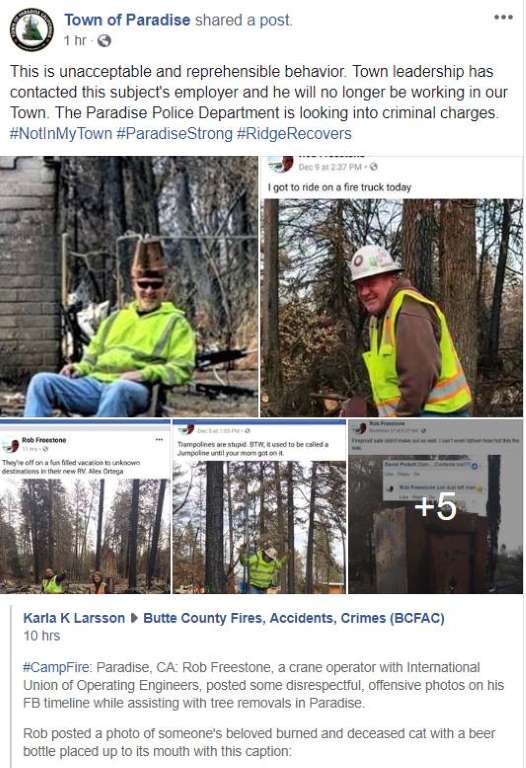
A news story making the rounds about Rob Freestone, and other Camp Fire Workers, who took vile pictures of themselves amongst the ruins of people’s lives after the tragic wildfire in Paradise, California, perfectly illustrates the concept of Free Speech as outlined in the First Amendment of the Constitution of the United States.
Freestone and two other workers took pictures of themselves laughing it up over the corpses of beloved pets, in destroyed homes, jumping on burned out trampolines with captions denigrating the owners, along with other pictures. That these pictures might upset the owners of the homes and their neighbors who had recently lost everything, including friends and family, is not at all surprising. What can be done about people who do such things? That is where the Freedom of Speech of the camp fire workers comes into play.
One group of people seems to think the men are free to say what they want without repercussions based on the First Amendment. A second group of people want the camp fire workers to be arrested and charged with a crime for their vile behavior. Both groups are incorrect. The concept of the First Amendment seems relatively simple to me. People are protected against an overly aggressive government attempting to incarcerate or fine them because of their words. However, the camp fire workers are in no way protected from ramifications devised by sources not the state.
The company that employed the men, Bigge Crane and Rigging Co. and their contractors PG&E are entitled to do as they will. They have done so. Bigge announced the three men were fired from their jobs and wrote an apology to the residents of Paradise published as a press release.
I don’t necessarily fully support Bigge for this decision, nor disagree with it, but I absolutely think Bigge has the authority to fire the men. If law enforcement agencies bring charges against the camp fire workers, which they are looking into doing, then I find myself on the side of the workers. The police should not be allowed to charge people with a crime for posting deeply offensive photographs.
Now, to demonstrate the difficulty of law, let’s suppose Bigge didn’t fire the workers and the state subsequently refused to give future contracts to the company because of that decision. This is where law becomes problematic and why we have a judicial branch. This situation not being the case, I won’t wade into the thorny issue.
The outcome as it stands cleanly and neatly illustrates the protections of the First Amendment. We are entitled to say what we will, with exceptions carved out over time by the courts, without fear of arrest or fine by the state. We are not free to say what we want without repercussions from our employers, family, friends, and random strangers on the internet.
You might find particular words to be offensive while another person supports and agrees with those same utterances. That is the point of the First Amendment to a large degree. The state, in the form of whatever political party is currently in power, will always like certain speech and find other words to be dangerous. The state, and the state alone, is very limited in how it can respond to such speech, this is a good thing.
Tom Liberman